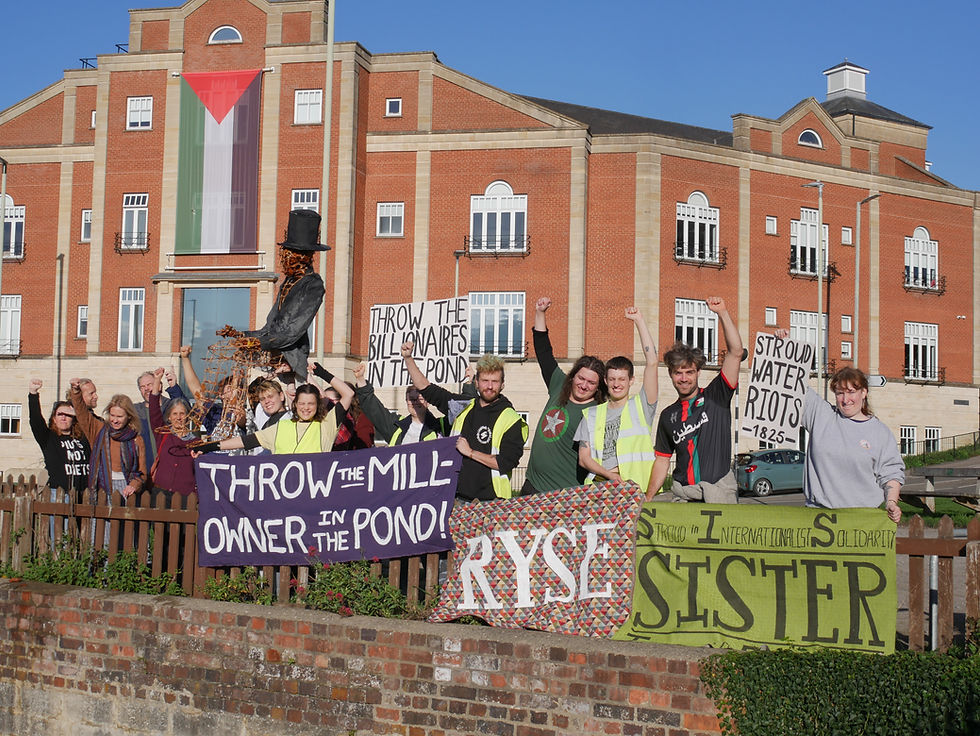Building Living Systems
- Nils Agger
- Aug 25, 2022
- 4 min read

(Photo: Decision making at the Global Justice Rebellion Site, October 2019, St James Park, London)
“You don't get the answers from a book. You look for a PROCESS through which you can learn, read and learn … You dont have to know it in advance because if you do you will kill it by clamping this down on the people you are dealing with” - We Make The Road By Walking, Myles Horton & Paulo Freire
Since the winter of 2022 we have been spending time each week as a team at The RYSE collectively building what is called Living Systems to support us in our work and to turn our values into a shared practice. From the start we wanted to actively build a working culture that could sustain the work we set out to do, knowing that if we don't consciously develop the ways we are working together we will just end up unconsciously practising often unhealthy ways of working inherited from the dominant society around us.
A way to describe a system is as a set of interconnected, interlinked processes which can happen at various levels of society and in ecosystems. There is no way we can avoid being a part of and working with different kinds of systems, but we always have the possibility to actively build and rebuild the systems we want in our work and in our daily life, built on the values we want to embody. Learning ourselves how to work with a process of system building is also an educational process through which we can explore and change our lives together.
“We do not have to choose any more between an egalitarian or hierarchical start to the human story. Let us bid farewell to the ‘childhood of Man’ and acknowledge (as Lévi-Strauss insisted) that our early ancestors were not just our cognitive equals, but our intellectual peers too. Likely as not, they grappled with the paradoxes of social order and creativity just as much as we do; and understood them – at least the most reflexive among them – just as much, which also means just as little. They were perhaps more aware of some things and less aware of others. They were neither ignorant savages nor wise sons and daughters of nature. They were, as Helena Valero said of the Yanomami, just people, like us; equally perceptive, equally confused.”
― David Graeber and David Wainwright, The Dawn of Everything: A New History of Humanity
As is suggested in The Dawn Of Everything, humanity has been organising our societies in a huge amount of diverse ways, and so any one way of categorising different systems involved when a group of people works together and collaborates will always be just that, one possibility out of many. We chose as a starting point the key systems as outlined by the people at Nonviolent Global Liberation, which are:
Decision making - how we make decisions about different things
Conflict - how we respond to conflict in the group
Resource flow - how we distribute resources (time, money, skills, knowledge)
Information flow - how information is shared
Feedback - how we respond to and incorporate feedback
We chose to approach systems building in a non-directive way, using the guidance from Navigates handout on System Development, which for us took the shape of setting time aside at a regular time each week where we were:
Laying out all the different ways we are currently doing things and the assumptions we work from, mapping the already existing systems we are embodying, asking ourselves
What is working in how we do things?
What is not working in how we do things?
If we had a magic wand and could realise our hopes and dreams, what would it look like?
Gathering the important values which we want our systems to support us in practing, asking ourselves
How could this system support us in the work we do?
Developing proposals based on which implicit systems are already in place and whats important to us as a groups, either:
Giving the job to one person to take the notes away and make a couple of suggestions for possible solutions before taking decisions as a group
Going through concrete issues with our implicit systems with everyone present and step by step proposing proposing and deciding on solutions until we had a complete system worked out
You can have a look at the results of our work so far by following the links to
The systems we build in this way will keep developing, informed by what we learn as a team and adapting to support The RYSE’s purpose in the world. They are not strict procedures which have to be followed just for the sake of it, but living and breathing creations. Building a shared consciousness together about mapping and changing ways of working together has also built our knowledge about how we can adapt our systems for what the future brings
“What if, instead of telling a story about how our species fell from some idyllic state of equality, we ask how we came to be trapped in such tight conceptual shackles that we can no longer even imagine the possibility of reinventing ourselves? ”
― David Graeber, The Dawn of Everything: A New History of Humanity
If you want to read more about systems building we highly recommend Navigates list of resources





Comments